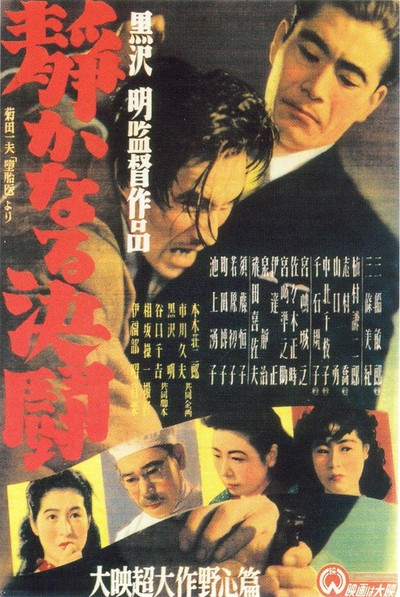Films A-Z

 Redbeard
Redbeard
Akira KUROSAWA
Japan, 1965
Japan
1965
185 min.
35mm, Blu-ray, DCP
CH, CH fr.
Japanisch/d/f
Young Dr. Yasumoto returns to Edo following three years of medical training in Nagasaki. Believing ...
More

 Dersu Uzala
Dersu Uzala
Akira KUROSAWA
Japan, 1975
Japan
1975
144 min.
35mm, DVD, Blu-ray, DCP
CH, DE, AT
Russisch/d
A military explorer meets and befriends a Goldi man in Russia’s unmapped forests. A deep and abiding ...
More

 Dodeskaden
Dodeskaden
Akira KUROSAWA
Japan, 1970
Japan
1970
140 min.
Blu-ray, DCP
CH
Japanisch/d
THE TOWN―its denizens like to call it that―is little more than an ugly array of sheet metal and tar ...
More

 Drunken Angel - Yoidore tenshi
Drunken Angel - Yoidore tenshi
Akira KUROSAWA
Japan, 1948
Japan
1948
98 min.
DCP
CH
Japanisch/d
A young man calls at Dr. Sanada’s clinic saying he has got his hand smashed by a closing door. This ...
More

 Hakuchi - Idiot
Hakuchi - Idiot
Akira KUROSAWA
Japan, 1951
Japan
1951
166 min.
35mm, DVD
CH, DE, AT
Japanisch/d/f
The Russian writer Fyodor Mikhailovich Dostoyevsky wanted to show a really good person in his ...
More

 High and Low - Tengoku to jigoku
High and Low - Tengoku to jigoku
Akira KUROSAWA
Japan, 1963
Japan
1963
143 min.
35mm, DVD
CH, CH fr.
Japanisch/d/f
Kingo Gondo, executive director of the National Shoe Company, meets with three other executives from ...
More

 Ikiru - Einmal wirklich leben
Ikiru - Einmal wirklich leben
Akira KUROSAWA
Japan, 1952
Japan
1952
143 min.
Blu-ray, DCP
CH
Japanisch, Englisch/d
Kanji Watanabe was the Chief of the Citizens’ Section of the Municipal Office with a record of 30 ...
More

 Madadayo
Madadayo
Akira KUROSAWA
Japan, 1993
Japan
1993
134 min.
HD, Blu-ray, DCP
CH, DE, AT
Japanisch/d
More

 Rashomon
Rashomon
Akira KUROSAWA
Japan, 1951
Japan
1951
88 min.
35mm, DVD, Blu-ray, DCP
CH, DE, AT
Japanisch/d/f
Rashomon is widely considered one of the greatest films ever made: Three men take shelter at one of ...
More

 Sanjuro - Tsubaki Sanjûrô
Sanjuro - Tsubaki Sanjûrô
Akira KUROSAWA
Japan, 1962
Japan
1962
96 min.
Blu-ray, DCP
CH
Japanisch/d
A few years before the War of the Meiji Restoration in Japan in 1868, a group of young progressives, ...
More

 Scandal - Sukyandaru (Shubun)
Scandal - Sukyandaru (Shubun)
Akira KUROSAWA
Japan, 1950
Japan
1950
104 min.
35mm
CH, DE, AT
Japanisch/d/f
Kurosawa's favourite actor of the early years was Toshiro Mifune. Here he plays the famous painter ...
More

 Shizukanaru Ketto
Shizukanaru Ketto
Akira KUROSAWA
Japan, 1949
Japan
1949
95 min.
HD, Blu-ray
CH, DE, AT
Japanisch/d
At the end of the war, doctor Fujisaki is wounded during an emergency operation in the hospital. A ...
More